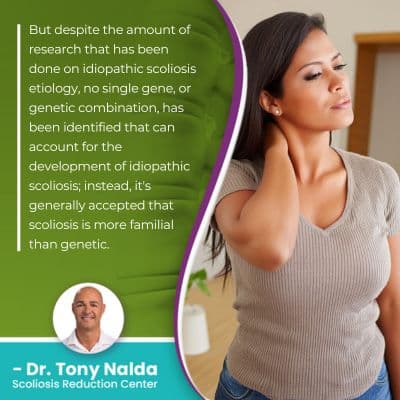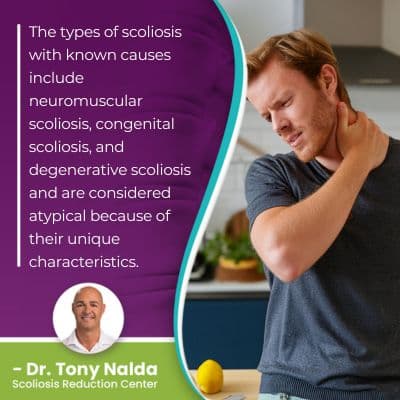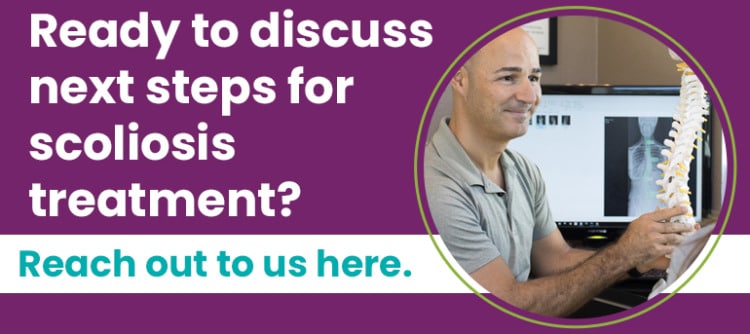Is Scoliosis Genetic? [Everything You Need To Know]

Scoliosis is a highly-variable condition, which is why it's so important that treatment plans are fully customized. Condition type is determined by causation, and the main types of scoliosis are idiopathic, neuromuscular scoliosis, congenital scoliosis, and degenerative scoliosis.
A lot of research has been dedicated to determining whether or not idiopathic scoliosis is genetic. Having a family history of scoliosis is a risk factor, yet no single gene or genetic mutation accounting for its onset has been identified; the condition is thought, instead, to be familial.
To reach a better understanding of scoliosis causation, let's explore the different types, and the unknown/known causes of each.
Table of Contents
What is Scoliosis?
Current estimates have close to seven million people living with scoliosis in the United States alone, and as highly prevalent as scoliosis is, a lot of time has been spent trying to identify its underlying cause.
There was a time when scoliosis screening was performed in schools across the States because of the benefits associated with early detection, but that has since changed, meaning that parents and/or caregivers, and patients themselves, have to notice the early signs of scoliosis.
In childhood scoliosis, the main effects involve postural changes (uneven shoulders, uneven hips, a rib cage arch), and in adults, the main effect is pain because scoliosis becomes a compressive condition once skeletal maturity has been reached.
Scoliosis is a structural spinal condition that is the leading spinal condition among school-aged children; it involves the development of an unnatural spinal curve that bends to the side and also twists, making scoliosis a 3-dimensional condition.
Scoliosis is also progressive, so it's virtually guaranteed to get worse over time, which means the size of the unnatural spinal curve is increasing as are the condition's effects.
When scoliosis is first diagnosed, part of the process involves further classifying conditions based on important patient and condition variables: patient age, condition severity, curvature location, and condition type.
Condition type is determined by causation, and in the majority of scoliosis cases, we don't know why they developed, although we know it's growth that makes conditions progress.
So the question is whether or not idiopathic scoliosis is considered genetic.
Idiopathic Scoliosis
 Approximately 80 percent of known diagnosed cases of scoliosis are classified as idiopathic scoliosis, meaning not associated with a single-known cause; the remaining 20 percent are associated with known cases.
Approximately 80 percent of known diagnosed cases of scoliosis are classified as idiopathic scoliosis, meaning not associated with a single-known cause; the remaining 20 percent are associated with known cases.
So the question is whether or not idiopathic scoliosis is a genetic condition because we still don't fully understand what triggers its onset.
Idiopathic scoliosis doesn't mean there is a complete absence of a cause, just that there isn't a clear single-known cause; idiopathic scoliosis is, instead, thought to be multifactorial: caused by a number of different factors that can vary from person to person.
Is Idiopathic Scoliosis Genetic?
Some of the factors contributing to the development of idiopathic scoliosis could be considered genetic factors. Given the prevalence of scoliosis, particularly childhood scoliosis, a lot of effort has been made to determine the cause.
But despite the amount of research that has been done on idiopathic scoliosis etiology, no single gene, or genetic combination, has been identified that can account for the development of idiopathic scoliosis; instead, it's generally accepted that scoliosis is more familial than genetic.
One condition characteristic that supports the genetic nature of scoliosis is the fact that a family history of scoliosis sis considered a risk factor; if someone in the family has been diagnosed with scoliosis, it's more likely that another family member will also be diagnosed, but remember, families share a lot more than just their genes.
What else do families share?
Families share body types, diet, lifestyle, responses to stress, posture, socioeconomic factors, geography, and more, so in light of the multifactorial nature of scoliosis, it makes sense that one, or more than one, of those types of familial factors could contribute to the condition's development.
And what about the types of known causes for scoliosis?
Types of Scoliosis with Known Causes
The types of scoliosis with known causes include neuromuscular scoliosis, congenital scoliosis, and degenerative scoliosis and are considered atypical because of their unique characteristics.
In typical cases of idiopathic scoliosis, the unnatural spinal curvature will bend to the right, away from the heart, but in atypical cases, the curve can bend to the left, towards the heart, and when I see this in an X-ray, it's a red flag for me that there is an underlying pathology that's caused the scoliosis to develop.
In neuromuscular scoliosis, the scoliosis develops as a secondary complication of a larger neuromuscular condition such as cerebral palsy, muscular dystrophy, and spina bifida, and this complicates the treatment process because the underlying neuromuscular condition has to be the focus of treatment; the scoliosis is more of a symptom of a larger issue.
In cases of congenital scoliosis, the cause is the spine not forming properly in utero, so babies are born with the condition, and it's a rare condition type, affecting approximately 1 in 10,000.
Spinal malformations can include vertebrae being misshapen and more triangular in shape, causing the spine to wedge forward and develop an unnatural curvature of the spine.
Degenerative scoliosis affects older adults and is caused by natural age-related degeneration and the cumulative effect of certain lifestyle factors.
Most spinal degeneration starts the intervertebral discs, and as they degenerate and change shape, this affects the position of adjacent vertebrae attached and can cause the spine to shift out of alignment as certain vertebral bodies become more unnaturally tilted over time.
Lifestyle factors like carrying excess weight, low activity levels, chronic poor posture, and excessive consumption of alcohol and/or smoking can also factor into a person's level and rate of spinal degeneration.
So as you can see, scoliosis is a complex condition and its highly-variable nature necessitates the complete customization of treatment plans.
Scoliosis Treatment and Causation
 When it comes to condition type, this is a key piece of information that conditions are classified around because to address scoliosis effectively, its underlying cause has to guide the focus of treatment.
When it comes to condition type, this is a key piece of information that conditions are classified around because to address scoliosis effectively, its underlying cause has to guide the focus of treatment.
In cases of idiopathic scoliosis where we don't know what triggered its initial onset, we do know what triggers it to progress, and we do know how treatable scoliosis can be.
So what I remind patients is that not knowing a condition cause doesn't mean not knowing how to manage it effectively; in fact, in my experience of treating idiopathic scoliosis, the more important factor is the type of treatment applied, and when it's applied; as a progressive condition, the best time to start scoliosis treatment is always now.
So whether scoliosis has genetic factors, is familial, or has a known cause, the most important decision to be made is how to treat the condition effectively, and that means deciding on a traditional surgical response or a more natural modern conservative response.
Conservative treatment is what patients of the Scoliosis Reduction Center benefit from; they also benefit from an integrative approach that combines multiple scoliosis-specific treatment disciplines for the best possible results.
When causation is known, treatment is shaped around it, but when conditions aren't considered genetic and are instead considered to be familial and multifactorial, scoliosis can be highly treatable and responsive to a proactive treatment response.
Conclusion
Despite the fact that scoliosis has been around since ancient times, there is still a lot we don't know about it.
While we do know how to manage it effectively to give patients the best possible quality of life, we still can't fully say whether scoliosis is a genetic condition; there appear to be genetic factors, but are those factors more familial than genetic?
The general consensus is that idiopathic scoliosis is caused by a combination of factors that can vary from patient to patient, and while one of those factors could be a specific gene, or genetic mutation, it has yet to be clearly identified.
In addition, identical twin studies suggest that scoliosis isn't genetic based on one twin having scoliosis, while the other doesn't, despite sharing the same genes, or in cases where both twins have scoliosis, they have different types of scoliosis, so twin studies suggest scoliosis has heritability factors, environmental factors, and familial factors that could all play a role in the condition's etiology.
While there are never treatment guarantees, being able to detect scoliosis early means better chances of treating it effectively.
Regardless of what causes scoliosis to develop initially, what's most important is how a diagnosis is responded to; if you develop scoliosis, make sure you are aware of all treatment options available, and the difference in how surgical treatment can shape spinal health, versus how conservative treatment affects it.
Dr. Tony Nalda
DOCTOR OF CHIROPRACTIC
After receiving an undergraduate degree in psychology and his Doctorate of Chiropractic from Life University, Dr. Nalda settled in Celebration, Florida and proceeded to build one of Central Florida’s most successful chiropractic clinics.
His experience with patients suffering from scoliosis, and the confusion and frustration they faced, led him to seek a specialty in scoliosis care. In 2006 he completed his Intensive Care Certification from CLEAR Institute, a leading scoliosis educational and certification center.
About Dr. Tony Nalda
 Ready to explore scoliosis treatment? Contact Us Now
Ready to explore scoliosis treatment? Contact Us Now





